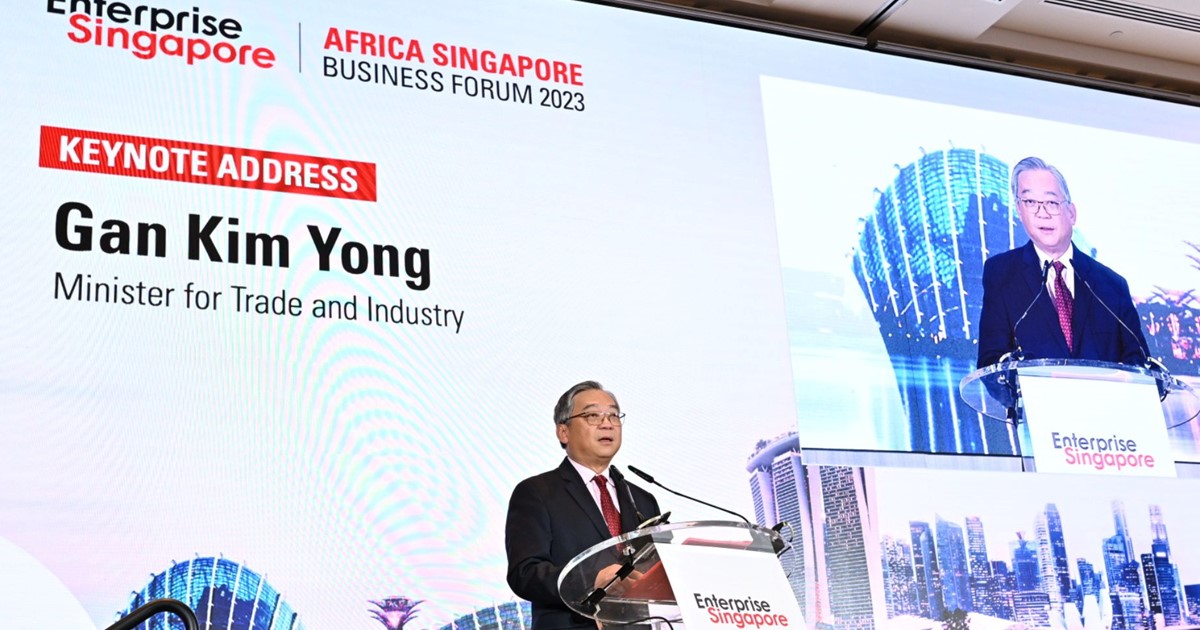: Five new business deals signed as more Singapore firms respond to call of Africa

SINGAPORE - Five agreements to boost business ties were signed between Singaporean and African companies at the seventh edition of the Africa Singapore Business Forum (ASBF) on Tuesday.
The new deals add to a lengthening list of recently concluded agreements between Singapore brand owners and their African counterparts who are seeking opportunities in manufacturing, digitalisation and technology, sustainable development, transport, and logistics.
First launched in 2010 on a biennial basis, the ASBF serves as a key platform for Singapore and African business leaders and government officials to discuss trade and investment opportunities. The forum has brought together more than 5,000 thought leaders from 40 countries.
The event comes on the heels of Prime Minister Lee Hsien Loong’s official visits in the past year to Rwanda, South Africa and Kenya – aimed at strengthening bilateral ties, including business linkages.
According to Enterprise Singapore (EnterpriseSG), the Republic’s bilateral trade in goods with the continent has grown by about 15 per cent every year between 2019 and 2022, reaching $19.4 billion in 2022. Singapore companies’ investments in the African continent had cumulatively reached $32.1 billion as at 2021.
Mr Tan Soon Kim, EnterpriseSG’s deputy chief executive officer for global markets, said: “Singapore companies are recognising the value of diversifying their businesses to markets farther afield and have been responding to our call to explore Africa.”
In his keynote address, Singapore’s Minister for Trade and Industry Gan Kim Yong said: “Today, there are about 100 Singapore companies present in 40 countries in Africa.”
Africa comprises 54 countries, with a total population of 1.4 billion people.
Companies have invested in various sectors, such as manufacturing, logistics, agri-commodities and urban solutions, as well as exploring potential in digitalisation and sustainability.
“I encourage more Singapore companies to seek out business and investment opportunities in Africa,” said Mr Gan.
Singapore is also in the process of negotiating new pacts to improve connectivity with African nations – both on a bilateral basis and with the African Continental Free Trade Area (AfCFTA).
On Aug 20, the Kenya-Singapore Investment Promotion and Protection Agreement entered into force.
Mr Gan said such agreements provide certainty to companies from both Africa and Singapore that operate in each other’s markets, thus boosting trade and investment flows between both sides.
Singapore’s Ministry of Foreign Affairs and Ministry of Trade and Industry will also offer a capacity-building course in trade negotiations as part of the Singapore Cooperation Programme’s Singapore-Africa Partnership Package.
Mr Gan said the course will start in January 2024 and is designed to meet the needs of African trade negotiators, even as it helps to foster stronger relations between the governments as well as officials.
To ensure better access to trade financing, Enterprise Singapore is also expanding the pool of participating financial institutions in the Enterprise Financing Scheme to include selected foreign-based financial institutions and multilateral development banks with strong expertise and willingness to finance Singapore enterprises venturing into Africa and other emerging markets.
“With these developments, I am optimistic about the future of Africa-Singapore and Africa-Asia collaborations. Singapore welcomes any new opportunities to deepen the relationship that we share with Africa,” said Mr Gan.
The business deals signed on Tuesday also included a memorandum of understanding between three Singapore companies – Robust International, Adatos, and Trames – to collaborate on projects in Africa.
Robust is a home-grown global commodities trader, dealing in nuts, pulses such as peas and lentils, and sesame. It will work with Adatos to deploy its partner’s AI solutions to provide agricultural insights such as weather prediction, yield forecast and nutrients usage for its sesame crops in Nigeria.
Trames will provide bespoke logistics management solutions for Robust’s supply chain in Africa and globally. These solutions will help local farmers farm more sustainably, while assisting Robust in enhancing its supply planning and yields.
Other agreements included another MOU, between Singapore engineering firm NivéSal and Ghana’s SKY 40-40, to set up manufacturing operations in Takoradi, Ghana, to produce polymer-based sustainable building material products.
The three-day ASBF 2023, which ends on Thursday, is themed “Driving Africa’s Growth through Digitalisation, Manufacturing and Sustainability”. More than 500 business and government leaders from 40 countries are expected to attend the event, said EnterpriseSG.
Source: The Straits Times © Singapore Press Holdings Limited. Reproduced with permission.

